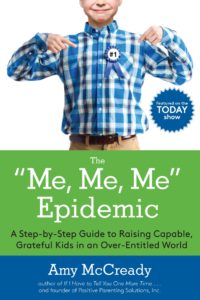Guest Blog: Not Inconsequential by Amy McCready, author, The Me, Me, Me Epidemic: A Step-by-Step Guide to Raising Capable, Grateful Kids in an Over-Entitled World
 Consequences are the steamed broccoli of the parenting world. We may initially love the idea of our kids’ learning valuable lessons from their mistakes and beginning to step up to their responsibilities. But when it comes to serving them up every day, consequences can be hard to choke down.
Consequences are the steamed broccoli of the parenting world. We may initially love the idea of our kids’ learning valuable lessons from their mistakes and beginning to step up to their responsibilities. But when it comes to serving them up every day, consequences can be hard to choke down.
What actually constitutes a consequence, anyway? Think back to your high-school physics class. Every action creates another action. In the case of perfect parenting (and in a perfect world), a positive action (like helping a younger sibling build a marble track) would produce a positive reaction (the younger sibling shares his favorite marbles). A negative action (feeding leftovers to the family dog) would produce a negative reaction (family dog throws up all over the perpetrator’s shoes).
Of course, the parenting world is not perfect, and sometimes our kids see no consequences at all for their actions (they decline to practice their presentation on Neptune, only to be saved by a fire drill) or face a positive consequence for a negative action (they forget their PBJ lunch and a friend shares his pizza) or vice versa (they stop to pick up litter from a flower bed in a neighbor’s yard, only to be scolded for trespassing). These things happen, but that’s why it’s all the more important to allow consequences to play out when they may. Why? Because they pack a valuable punch when it comes to teaching our kids about life in the real world.
Consequences adeptly teach lessons when parents cannot. Consider this situation, told two ways:
Thirteen-year-old Hannah is heading out with friends to a nearby park for an afternoon of tennis. It’s supposed to warm up, so you remind Hannah to bring a water bottle. She mindlessly agrees, then wanders off to check her ponytail. You nag her again when she comes back downstairs, but she dismisses you as if you aren’t even there. While she’s out of the room, you fill up a small water bottle and put it into her tennis bag where she’ll see it when she takes out her racket—you wouldn’t want her to get thirsty, after all. When Hannah comes back into the room she’s in a hurry, her mind elsewhere. She grabs her bag and heads to the park. Sure enough, she gets warm while playing tennis and is glad for a drink. Does she thank you? Of course not. Does she remember a water bottle next time? Not likely.
Thirteen-year-old Hannah is heading out with friends to a nearby park for an afternoon of tennis. You mention that it’s supposed to warm up, and ask if there are drinking fountains or if she’d like to bring water. Hannah wanders out of the room mumbling something about “maybe” and “there are drinking fountains.” When she returns, she’s in a hurry—she grabs her bag and leaves. Sure enough, she gets warm while playing tennis. But instead of reaching for a water bottle, she has to cross the park multiple times to drink from the water fountains. Is she annoyed when she gets home? Of course. Does she remember a water bottle next time and every time thereafter? You bet.
Hannah is going to learn much better from being inconvenienced than from being relentlessly reminded and nagged. Not only has she learned to bring water along when she plays tennis, but also she can apply the lesson to other areas of life. It’ll put her in a mind-set to prepare more thoroughly for her activities in the future because she knows you won’t take the responsibility from her. Cruel? Not at all, considering she’ll be making much bigger decisions than that in a few years.
Of course, we wouldn’t expect our four-year-old to remember his preschool field trip permission slip, but we can expect him to remember his backpack when he hops out of the minivan (or suffer the indignity of walking in without it). Just as a seven-year-old can use a checklist to remember gym shoes and library books on the correct day, a thirteen-year-old can keep track of her own music lesson and sports practice schedule, and an eighteen-year-old can reliably pack for an overnight trip. But without the practice at a young age, even an older child will flounder with simple responsibilities.
When we look at consequences primarily as a teacher for our kids, we get less worked up about the fact that the six-year-old opened half her birthday presents when we weren’t looking or the eleven -year-old gave himself a haircut that won’t look nearly as cool the next day as he thinks it will. Instead, we can calmly let the consequence (fewer surprises on a special day, the necessity of wearing a hat for the next month) do the talking for us.
The fact of the matter is that our kids are going to mess up. We can either make the best of their mistakes by letting them see the direct results and offering guidance or we can throw away learning opportunities by rescuing them. Rescued kids do learn something, but it’s “If I mess up, I’ll always get rescued. I can do what I want without worrying about what will happen.”
 Amy McCready is the Founder of PositiveParentingSolutions.com and the author of The “Me, Me, Me” Epidemic: A Step-by-Step Guide to Raising Capable, Grateful Kids in an Over-Entitled World as well as If I Have To Tell You One More Time: The Revolutionary Program That Gets Your Kids to Listen Without Nagging, Reminding, Or Yelling. Amy is a regular contributor on The TODAY Show and has also appeared on Rachael Ray, CNN, Fox & Friends, MSNBC, Steve Harvey and elsewhere. In her most important job, she is mom to two fabulous young men. Learn more at www.AmyMcCready.com.
Amy McCready is the Founder of PositiveParentingSolutions.com and the author of The “Me, Me, Me” Epidemic: A Step-by-Step Guide to Raising Capable, Grateful Kids in an Over-Entitled World as well as If I Have To Tell You One More Time: The Revolutionary Program That Gets Your Kids to Listen Without Nagging, Reminding, Or Yelling. Amy is a regular contributor on The TODAY Show and has also appeared on Rachael Ray, CNN, Fox & Friends, MSNBC, Steve Harvey and elsewhere. In her most important job, she is mom to two fabulous young men. Learn more at www.AmyMcCready.com.
Tags: amy mccready, having a family, motherhood, Positive Parenting, raising kids















